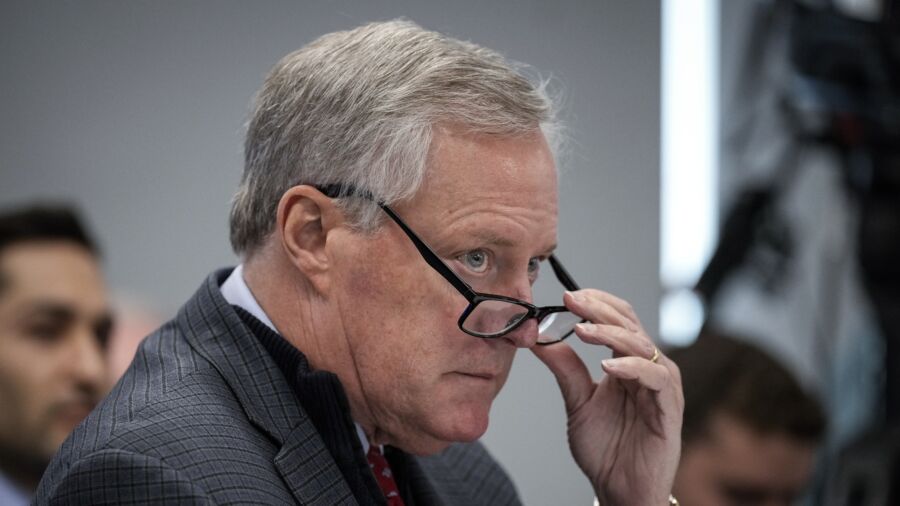All 19 defendants in Fulton County, Georgia, District Attorney Fani Willis’s 2020 election probe have pleaded not guilty to the charges against them and waived their formal arraignments.
Former White House chief of staff Mark Meadows was among the final defendants to enter a plea on Sept. 5, alongside former Trump attorney John Eastman and former Coffee County election official Misty Hampton.
Former Coffee County GOP Chair Cathy Latham entered her plea on Sept. 4, while former Georgia GOP Chair David Shafer and Georgia State Sen. Shawn Still entered theirs on Sept. 3. Former Justice Department official Jeffrey Clark’s plea was submitted on Sept. 1.
In total, 41 charges have been filed against the defendants, including violation of Georgia’s Racketeer Influenced and Corrupt Organizations (RICO) Act, solicitation of violation of oath by a public officer, impersonating a public officer, and forgery, among others.
The Aug. 14 indictment alleges that President Donald Trump and the other co-defendants engaged in a conspiracy to “unlawfully change the outcome” of Georgia’s 2020 presidential election.
President Trump pleaded not guilty on Aug. 31 to the 13 charges he is facing.
Removal Decision Pending
Mr. Meadows, who was charged with violating the state’s RICO Act and soliciting violation of oath by a public officer, is one of a handful of defendants seeking to have their cases removed to federal court.
According to the 98-page indictment, the former White House official’s role in the alleged racketeering conspiracy was coordinating and attending meetings to strategize ways to disrupt and delay the counting of the electoral votes on Jan. 6, 2021.
The document also claims that he pressured an investigator in the Georgia secretary of state’s office to speed up the Fulton County signature verification process and that he participated in a phone call in which President Trump urged Georgia Secretary of State Brad Raffensperger to “find” evidence of determinative voter fraud in the election.
In filing the notice of removal, Mr. Meadows’s legal team noted that the actions he had been indicted for were performed in his capacity as a federal official. As such, they argued that the case should either be dismissed or tried in a federal court.
U.S. District Judge Steve C. Jones of the Northern District of Georgia held a hearing on the matter on Aug. 28, during which he heard several hours of testimony from Mr. Meadows, Mr. Raffensperger, and other witnesses.
After the hearing, the Obama-appointed judge ordered the defense and prosecution to brief him on whether he could hear the case in federal court if it was determined that “at least one (but not all) of the overt acts” of which Mr. Meadows stands accused had occurred “under the color of” his office.
Prosecutors responded that such a finding would not be sufficient to authorize removal because Mr. Meadows’s prosecution was not due to any singular “overt act” but rather because he “knowingly and willfully entered into an agreement to violate the Georgia RICO Act.”
“The defendant is charged in Count 1 with agreeing to join a conspiracy that planned to overturn the lawful results of an election in Georgia,” prosecutors wrote in an Aug. 31 filing (pdf). “A scenario where at least one, but not all, of the overt acts attributed to the defendant in Count 1 of the Indictment occurred under color of office … would not demonstrate that his agreement to join in the RICO conspiracy described in Count 1 was an act ‘for or related to’ his duties as Chief of Staff.”
But Mr. Meadows’ attorneys noted that, under the Federal Officer Removal Statute, civil lawsuits or criminal prosecutions against or directed to federal officers may be removed to the appropriate U.S. district court “for or relating to any act under color of [federal] office.”
Trump Moves to Sever Case
After entering his not-guilty plea last week, President Trump sought to sever his case from the other defendants, given the different timelines being requested.
Ms. Willis had initially proposed March 4, 2024—the day before Super Tuesday—as the trial start date for all defendants. But as the former president is also a current presidential candidate, he objected to that date.
Fellow defendant Kenneth Chesebro also objected, demanding a speedy trial, so Judge Scott McAfee approved a Nov. 3 trial date for Mr. Chesebro only.
As other defendants are expected to follow suit, Ms. Willis alternatively proposed Oct. 23. But President Trump’s lead counsel said that date was too soon for him to adequately prepare for trial.
“Respectfully, requiring less than two months preparation time to defend a 98-page indictment, charging 19 defendants, with 41 various charges including a RICO conspiracy charge with 161 Overt Acts, Solicitation of Violation of Oath by Public Officer, False Statements and Writings, Forgery, Influencing Witnesses, Computer Crimes, Conspiracy to Defraud the State, and other offenses would violate President Trump’s federal and state constitutional rights to a fair trial and due process of law,” wrote Steven Sadow, President Trump’s attorney, in a court filing.
The attorney joined President Trump’s team on Aug. 24, just hours before the former president’s Fulton County arrest.
The new date would also conflict with Mr. Sadow’s schedule, as he is to appear in court for another case in Florida set to begin on Sept. 26.
President Trump’s team is hoping for a later trial date, after the 2024 election.
Matthew Vadum, Catherine Yang, and Reuters contributed to this report.
From The Epoch Times

